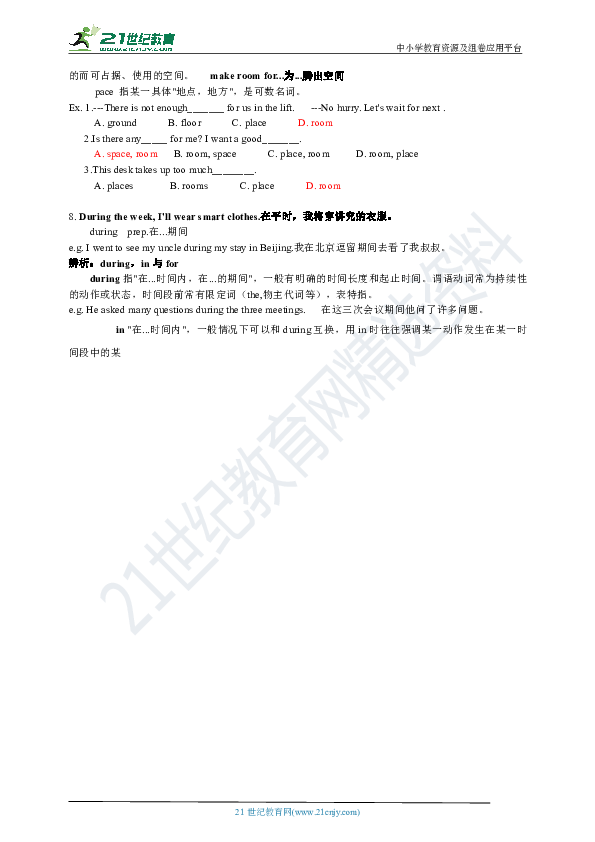Unit 7 Will people have robots?单元知识点讲义
文档属性
| 名称 | Unit 7 Will people have robots?单元知识点讲义 |  | |
| 格式 | zip | ||
| 文件大小 | 1.2MB | ||
| 资源类型 | 试卷 | ||
| 版本资源 | 人教新目标(Go for it)版 | ||
| 科目 | 英语 | ||
| 更新时间 | 2020-02-07 13:46:10 | ||
图片预览




文档简介
中小学教育资源及组卷应用平台
Unit 7 Will people have robots?单元知识点讲义
paper n. 纸张(不可数)
pollution n. 污染物
pollute v. 污染
prediction n. 预言;预测
predict v. 预测
astronaut n. 宇航员
dangerous a. 有危险的
danger n. 危险
disagree v. 不同意
possible a. 可能的
impossible a. 不可能的
probably adv. 很可能
二、短语归纳
play a part 参加(某事)
space station 太空站
over and over again 多次;反复地
hundred of 许多;大量
fall down 突然倒下;跌倒
look for 寻找;寻求
in great danger 在巨大的危险中
help with 帮助
for example 举例
in the future 在未来
look like 看起来像
wake up 醒来
fewer people 更少的人
14. less free time 更少的空闲时间
15. in ten years 10年后(提问用How soon)
fall in love with…爱上…
hundreds of +名词复数 数百/几百
(概数,类似还有thousands of; millions of)
the same as 和……相同
A be different from B A与B不同
wake up 醒来
get bored 变得厌倦(get/become+形容词)
keep a bird 养一只鸟
lots of /a lot of 许多+可数或不可数名词
disagree with sb. 不同意某人(的意见)
disagree on sth. 不同意某事
I don’t agree. = I disagree. 我不同意
on vacation 度假
help sb with sth 帮助某人做某事
live in an apartment 住在公寓里
live on the earth 住在地球上
besides与except =but(除…之外,不包括)
be able to与can 能、会
live on a space station 住在空间站
over and over again 一次又一次
10 years from now 今后10年
be difficult to do 做……有困难
the same … as 和……一样
重难点深度解析
1. Do you think there will be robots in people's homes? 你认为将来人们的家里会有机器人吗?
Do you think...? 结构通常用来征求对方的意见或看法,后面接宾语从句,从句用陈述语序。本句的肯定回答用"Yes, there will.",否定回答用"No, there won't."。
拓展:do you think还可以用作插入语,在特殊疑问句中放在特殊疑问词之后,疑问句其他部分用陈述语序。
e.g. Where do you think he comes from? 你认为他是哪里人?
Ex.1.______ get such a book?
A. Where do you think can I B. Where do you think I can
C. What do you think I can D. What do you think can I
2. There will be (more/less/fewer) people. 人口将会(更多/更少/更少)。
1)there will be是there be句型的一般将来时,意为"将有...",也可用there is\are going to be来表示。
(1)肯定句:there will be+主语+其他
e.g. There will be many tourists in our city next year. 明年我们的城市将有很多的游客。
(2)否定句:there will not\won't be+主语+其他
e.g. There won't be many people at tomorrow's party.明天的聚会上不会有很多人。
(3)一般疑问句:will there be+主语+其他?其肯定回答为"Yes, there will.",否定回答为"No, there won't."。
e.g. ---Will there be much time left?会剩下很多时间吗?---Yes, there will.\No, there won't.
(4)特殊疑问句:疑问词+will there be+主语+其他?
e.g. When will there be more free time?什么时候会有更多的空闲时间?
拓展:there be句型中不能用have\has表示"有...";there be 后面接并列名词时,谓语动词应与最近的名词在单复数上保持一致。
2) more, less和fewer都是形容词的比较级,用法如下:
①more是many 和much的比较级,“更多的”, 指数量、程度等,可以修饰可数名词复数或不可数名词。
②less是little的比较级,是more的反义词,译为“较少的”,通常与不可数名词连用。
③fewer为few比较级,与可数名词复数连用,“较少的”。
Ex.( )1.---Do you think Tina will go to Hong Kong? ---________ .
A. xg. /fewer)k can i Yes, she does. B. No, I don't. C. Yes, she will. D. No, she doesn't.
( )2.There_______ a sports meeting in our school next Monday.
A. will have B. is going to have C. will be D. are going to be
( ) 3.【2017东营】There _____ a football match and a concert this weekend. Which one would you like to go?
A. is B. are C. will be D. will have
( )4.【2017呼和浩特】To live a green life, we should try to save ______ energy and produce _____ pollution.
A. more; less B. less; more C. more; fewer D. most; least
3. There will be more pollution. 将会有更多的污染。
pollution n.污染 pollute v.(使)污染 polluted adj.被污染的
短语: white pollution白色污染 noise pollution噪音污染 air pollution空气污染
water pollution水污染 polluted water被污染了的水
e.g. Many rivers are polluted by the waste water from nearby factories. 很多河流被来自附近工厂的废水所污染。
You mustn't swim in the polluted river.你禁止在被污染了的河中游泳。
Ex. 1.There will be less p___________ in twenty years. The air will be much cleaner.
4. What’s your prediction about the future ?关于未来,你的语言是什么?
Future n. 未来 短语:in the future 在未来 in future 从今以后
辨析:1)均用于将来时态的句子;但in future“从今以后”,类似结构from now on,可用for the future 替换. In the future “将来”,通常指将来的某一段时间。
e.g. 他答应从今以后给我更多帮助。He promised to give me more help in future.
你将来打算做什么?What are you going to do in the future?
Ex.1.I hope to visit the USA sometime _______.
A. in the future B. in future C. for future D. of future
5.They help with the housework and do jobs working in dirty or dangerous places.他们帮助做家务和做像在肮脏或危险的地方工作的工作。
1)dangerous adj. 危险的 反义词:safe 安全的
danger n.危险 in danger 处于危险之中 out of danger 脱离危险
e.g. 不要玩火,危险!Don’t play with fire. It’s dangerous!
Ex. 1.The ice on the lake is very thin. It’s ______ for people to skate on.
A. dangerous B. exciting C. safe D. tiring
6. However, they agree it may take hundreds of years.然而,他们同意这可能还要花费几百年的时间。
hundred百,一百的 a hundred years ago一百年以前
e.g. He weighs more than one hundred kilograms.他体重超过100公斤。
hundreds of 表示不确切的数目,意为"数百,好几百,成百上千"。
e.g. Hundreds of students will take part in the games.成百上千的学生将会参加这次比赛。
拓展:hundred,thousand(千),million(百万)表示不确切的数目时,在词尾加s,且和of连用,表示"数百,数千,数百万"。但当这些词千有数词或several, some等修饰词时则不加s,也不跟介词of连用,直接跟名词。
e.g. Several hundred visitors will come to visit our school today.
= Hundreds of visitors will come to visit our school today.
今天会有数百名参观者到我们学校来参观。
Ex. ( )1.Nanjing is a city with many places of interest.________ tourists come here every year.
A. Thousand of B. Thousand C. Thousands D. Thousands of
( )2.---Have you seen the CCTV news on TV?
---Yes,_________ children had a good festival on the_______ Children 's Day.
A. thousands of, sixty B. ten thousand; sixty C. thousands of, sixtieth D. ten thousand, sixtieth
7. space station太空站
space不可数名词,意为"太空,空间",一般情况下不与冠词连用,但如果space前面有表示太空情况的形容词(如dark, cold, airless)修饰,则可与定冠词连用。
e.g. The earth travels around the sun in space.地球在太空中围绕太阳旋转。
辨析:space, room与place
space作"太空"讲时,是不可数名词;作"空间,空地"讲时,可与room互换。
room作"房间"讲时是可数名词;作"空间,地方"讲时是不可数名词,指可以容纳东西或其他目的而可占据、使用的空间。 make room for...为...腾出空间
pace 指某一具体"地点,地方",是可数名词。
Ex. 1.---There is not enough_______ for us in the lift. ---No hurry. Let's wait for next .
A. ground B. floor C. place D. room
2.Is there any_____ for me? I want a good_______.
A. space, room B. room, space C. place, room D. room, place
3.This desk takes up too much________.
A. places B. rooms C. place D. room
8. During the week, I'll wear smart clothes.在平时,我将穿讲究的衣服。
during prep.在...期间
e.g. I went to see my uncle during my stay in Beijing.我在北京逗留期间去看了我叔叔。
辨析:during,in与for
during指"在...时间内,在...的期间",一般有明确的时间长度和起止时间。谓语动词常为持续性的动作或状态,时间段前常有限定词(the,物主代词等),表特指。
e.g. He asked many questions during the three meetings. 在这三次会议期间他问了许多问题。
in "在...时间内",一般情况下可以和during互换,用in时往往强调某一动作发生在某一时间段中的某一时间点;during既可用在"在整个时间段期间",也可用在"某时间段内的某个时间点"。
e.g. Mike put his hand up three times during\in the class.在这节课内,迈克举了三次手。
for"(时间)长达...",强调时间由始至终,动作也贯穿这段时间的始终,可以和完成时或过去时连用。强调持续时间的长短,回答how long的问题;而during则指动作所发生的时间,回答when的问题。
e.g. He stayed in Beijing for two years.他在北京待了两年。
He swims every day during the summer.夏天他每天去游泳。
Ex.【2017安徽】Welcome to our hotel! I hope you’ll have a good time ______ your stay here.
A. after B. during C. with D. since
9. disagree v. 不同意;有分歧 Disagree with sb. “不同意某人”。
拓展:反义词 agree 同意 名词 disagreement 不同意;争论
e.g. 很抱歉,我不同意你的观点。 I’m sorry to disagree with you.
Ex. 【2017吉林】---We’re supposed to recycle paper and bottles. It can help the environment.
---_______. It can save money too.
A. It’s nothing B. Best wishes C. I agree
10.If buildings fall down with people inside, these snake robots can help look for people under the buildings如果建筑倒塌且有人在里面,这些蛇形机器人将能够帮助寻找建筑物下面的人。
1)fall down “滑到,倒下”。
e.g. 当她妈妈出去的时候,那个婴儿从床上掉了下来。
The baby fell down from the bed when her mother was out.
拓展: fall off 跌倒;从……上掉下来 fall over 向前摔倒; 跌倒 fall in love with 恋爱
2)look for “寻找”,强调找的过程;find是及物动词,“找到,发现”,强调结果。
e.g. 我找不到我的铅笔盒了。 I can’t find my pencil case.
我在找我的钥匙。 I am looking for my keys.
Ex.
11.This was not possible 20 years ago, but computers and rockets also seemed impossible 100 years ago.这些20年前看起来似乎是不可能的但是100年前电脑、火箭似乎也不可能。
Possible adj.可能的;可能发生的。 表示客观上潜在的可能性,也许实际发生的可能性不大。Possible一般不以人作主语。 反义词:impossible 不可能的
辨析:possible 和probably
1)possible 是形容词,所指的可能性小。可以与can或could连用。
2)probably副词,在句中位置比较灵活。可能性较大。
e.g. 这件事没有你恐怕不行。 It can’t be possible without you.
他大概听不见我们说话。He probably can’t hear us.
Ex. 1. I think Tom is ________ to win the high jump in this game.
A. like B. likely C. possible D. possibly
四、本单元语法讲解 一般将来时
◆ 一般将来时基本概念
一般将来时表示将来某一时刻的动作或状态,或将来某一段时间内经常的动作或状态。由助动词shall或will加动词原形构成,shall 用于第一人称,will用于第二、三人称。但现在也可以把will用于第一人称。在口语中,常用shall, will的缩写形式为’ll , 如:I’ll, you’ll等。Shall not的缩写式为: shan’t, will not 的缩写式为:won’t.
肯定句:I/We shall/will go. 例句: You/He/She/They Will go.
否定句:I/We shall/will not go. 例句:You/He/She/They Will not go.
疑问句:Shall I/we go? 例句: Will you/he/she/they go?
◆一般将来时常与一些表示将来的时间状语连用,如: tomorrow(明天), next week(下周), from now on(从现在开始);in the future(将来)等。
其时间状语有如下几种
1)his引导的短语 如 this year 2)tomorrow及其相关短语如tomorrow morning
3)next引导的短语 如 next month 4)from now on in the future in an hour 等。
◆一般将来时五种用法
(1)Will/Shall+ 动词原形 表示将要发生的动作或情况。
例句:a. I will (shall) arrive tomorrow.我明天到。
b. Will you be free tonight? 你今晚有空吗?
c. We won’t (shan’t) be busy this evening. 我们今晚不忙。
①在一般将来时的句子中,有时有表示将来时间的状语,有时没有时间状语,这时要从意思上判断是否指未来的动作或情况。
例句:a. Will she come? 她(会)来吗?
b. We’ll only stay for two weeks. 我们只待两星期。
c. The meeting won’t last long. 会开不了多久。
②在以第一人称I或we作主语的问句中,一般使用助动词shall,这时或是征求对方的意见或是询问一个情况
例句:a. Where shall we meet? 我们在哪儿碰头?
b. Shall we have any classes tomorrow?明天我们有课吗?
在这类问句中,也可以用will代替shall。
例句:How will I get there? 我怎么去?
(2)be going to+动词原形
①表示打算、准备做的事。
例句: a. We are going to put up a building here.我们打算在这里盖一座楼。
b.How are you going to spend your holidays?假期你准备怎样过?
②表示即将发生或肯定要发生的事。
例句:a. I think it is going to snow. 我看要下雪了。
b.There’s going to be a lot of trouble about this. 这事肯定会有很多麻烦。
③“will”句型与“be going to”句型区别。前者表示纯粹将来,后者表示打算、计划、准备做的事情,更强调主语的主观意愿。
例句:a. Tomorrow will be Saturday. 明天是周六了。
b. We are going to visit Paris this summer.今年夏天我们打算游览巴黎。
(3)用现在进行时表示。
表示位置转移的动词(如:go, come, leave, start, come, go, arrive, reach等),可用现在进行时态表示按计划安排即将发生的动作。
例句:a. Uncle Wang is coming. 王叔叔就要来了。
b. They’re leaving for Beijing. 他们即将前往北京。
c. I'm leaving for Beijing. 我要去北京。
(4)用一般现在时表示。
①某些词,如come, go, leave, arrive, start, get, stay, live, fly等的一般现在时也可表示根据规定或时间表预计要发生的动作.
例句: a. The new term starts (begins) on August 29th. 新学期八月二十九日开学。
b. He gets off at the next stop.他下一站下车
c. The train leaves at 12:00. 火车12点开出。
②当主句为将来时态或表示将来意义时,时间和条件的状语从句必须用一般现在时表将来。
例句: a. If it doesn’t rain tomorrow, we will go out for a picnic.
如果明天不下雨,我们将出去野餐。
b. Turn off the lights before you leave. 走前关灯。
c. I’ll write to her when I have time. 我有空会给她写信。
(5)“be to+动词原形”和 “be about to+动词原形”表示将来。
①“be to+动词原形”表示按计划要发生的事或征求对方意见。
例句:a. Are we to go on with this work? 我们继续干吗?
b. The boy is to go to school tomorrow.这个男孩明天要去上学。
c. He is to visit Japan next year. 明年他将访问日本。
②“be about to+动词原形”表示即将发生的动作,意为:很快,马上。后面一般不跟时间状语。
例句:a. We are about to leave.我们马上就走。
b. I am about to get up, mum. 妈妈,我立刻就起床。
◇there be句型中一般将来时的用法 There will be…
There is/are going to be…
例句:a. There is going to be a basketball match this afternoon. 今天下午将有一场篮球。
b. There will be a party in his house. 他家有要举行一个聚会。
(6)与条件状语从句和时间状语从句搭配使用时,从句用一般现在时表示,主句用一般将来时。
例句:If it is fine tomorrow, we’ll go swimming.
When he comes back, I’ll tell him to call you back.
(7)在“祈使句+and/or+陈述句”句型中,陈述句只能用will或情态动词加动词原形
例句:Work hard, and you will pass the exam. Work hard, or you will fail your exam.
实战练习:
I. Fill in the blanks with the proper answer.
( )1. He ________ very busy this week, he ________ free next week.
A. will be; is B. is; is C. will be; will be D. is; will be
( )2. --- Don’t forget to ask him to write to me.
--- I won’t. As soon as he _______, I’ll ask him to write to you.
A. will come B. came C. comes D. is coming
( )3. Frank _______ to see his grandma if he _______ free tomorrow.
A. will come; will be B. comes; is C. will come; is D. comes; will be
( )4. There _______ robots in 100 years, I think.
A. will have B. is going to have C. be D. are going to be
( )5. There _______ a talk on science in our school next Monday.
A. will give B. will be C. is going to give D. is
HYPERLINK "http://21世纪教育网(www.21cnjy.com)
" 21世纪教育网(www.21cnjy.com)
同课章节目录
- Unit 1 Where did you go on vacation?
- Section A
- Section B
- Unit 2 How often do you exercise?
- Section A
- Section B
- Unit 3 I'm more outgoing than my sister.
- Section A
- Section B
- Unit 4 What's the best movie theater?
- Section A
- Section B
- Unit 5 Do you want to watch a game show?
- Section A
- Section B
- Unit 6 I'm going to study computer science.
- Section A
- Section B
- Unit 7 Will people have robots?
- Section A
- Section B
- Unit 8 How do you make a banana milk shake?
- Section A
- Section B
- Unit 9 Can you come to my party?
- Section A
- Section B
- Unit 10 If you go to the party, you'll have a grea
- Section A
- Section B
